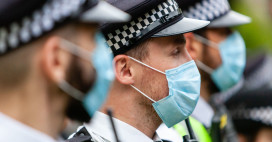
Policing Bill: Fair Trials and disability charities warn of discrimination and injustice from expansion of audio and video links in criminal proceedings
Criminal justice and disability organisations warn of discrimination and injustice caused by expansion of audio and video links in criminal proceedings
Fair Trials along with 11 disability and criminal justice organisations have raised concerns about the impact of proposals to expand the use of video and audio links in criminal proceedings.
The organisations believe that that the plans, included in the Police, Crime, Sentencing and Courts (PCSC) Bill, will significantly impact fundamental rights and equality in the criminal justice system for defendants, particularly those with learning difficulties, neurodiversity or mental distress.
Fair Trials’ Legal and Policy Officer, Griff Ferris said:
“During the pandemic we’ve all been forced to communicate much more via video and audio links. But it’s one thing using it for speaking to friends, family or colleagues, and another to expand its use widely for criminal hearings.
“Remote hearings can have an adverse effect on defendants’ right to access effective legal advice and assistance, their ability to take part effectively in hearings and their capacity to understand and challenge information and evidence being presented. For disabled defendants and those with learning difficulties, these challenges can be significantly worse.
Using audio and video links may make hearings more efficient for some but it threatens fairness, equality and justice for many others. Cutting costs should not be more important than protecting our fundamental rights.
“We need to ensure that defendants have a full health screening before taking part in video and audio link hearings, in order to protect their right to a fair trial.”
Kamran Mallick, CEO of Disability Rights UK said:
“This provision discriminates against Disabled defendants and could lead to serious miscarriages of justice. Trials should be shaped around the needs of defendants, to ensure that processes are fair and barriers are removed. Expert screening of the needs of defendants is absolutely vital.”
Video and audio link hearings were used widely in criminal justice proceedings during the Covid-19 pandemic, as an exceptional measure during lockdown, when courts were closed.
Clause 170 of the PCSC Bill would enable the use of video and audio links for a very wide range of criminal proceedings including: a preliminary hearing, a summary trial, a trial on indictment, appeals to the 2 Crown Court, sentencing hearings, bail hearings, proceedings under the Criminal Procedure (Insanity) Act, and under the Mental Health Act.
Research, including that published by the Equality and Human Rights Commission, has shown that defendants with learning difficulties, neurodiversity or mental health issues are especially at risk of unfair trials where trial proceedings are conducted remotely.
The Bill gives broad but unspecific discretion to judges to decide whether a video or audio link hearing is appropriate. However, judges are not medical professionals and may not know whether an individual has a disability or learning difficulty that makes it extremely difficult for them to engage effectively with remote proceedings.
The House of Lords will debate and vote on Clause 170 on Monday, January 10. The organisations are calling for peers to vote for an amendment tabled by Lord Ponsonby that would require that all defendants who might appear on a video or audio link from a location outside court should be subject to a health needs screening, and that screening information be made available to the judge responsible for listing, before listing is finalised.
Read the full statement by the organisations.
Read Fair Trials’ briefing for more detail about the impact of audio and visual links in criminal proceedings.


